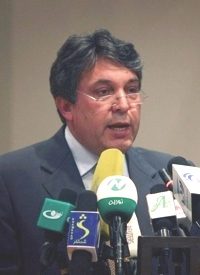
The average Afghan — and, indeed, the average American — may be deriving very little benefit from the United States’ continued occupation of Afghanistan and the billions of U.S. taxpayer dollars that continue to be poured into that country, but in both countries the well-connected make out quite handsomely. In Afghanistan, the key to prosperity and power, it seems, is having the surname of Karzai, as in President Hamid Karzai.
“In recent years,” the New York Times’ James Risen reports, “dozens of Karzai family members and close allies have taken government jobs, pursued business interests or worked as contractors to the United States government, allowing them to shape policy or financially benefit from it.” “American officials,” Risen writes, “say the Karzais and a handful of other well-connected families have benefited from the billions of dollars that the United States has poured into the country since 2001. That money has helped pay the salaries of some Karzais who are government employees, kick-started real estate development and construction projects involving family members and created demand for businesses tied to the Karzais.”
These are not just friends and relations who happened to be in the neighborhood when the U.S. government installed Hamid Karzai as president of Afghanistan, a position he has retained through two somewhat questionable elections. Risen points out that “most of them lived in the United States before going to Afghanistan, leveraging the president’s position to put them at the center of a new oligarchy of powerful Afghan families.” For example:
Before 2001, Yama Karzai, a nephew of the president, was living with his brothers in Quetta, Pakistan, and receiving financial support from relatives in the United States, Mohammad Karzai [a cousin of President Karzai who lives in Maryland] said. Today, Yama Karzai is a top Afghan intelligence official and owns a house in Virginia, according to land records. He did not respond to inquiries from The New York Times.
Hashim Karzai, a cousin of President Karzai, now works as a consultant to Pamir Airways, an airline based in Kabul that has been controlled by one of Mahmoud Karzai’s [President Karzai’s brother] business partners, and lives in Dubai on one of the luxurious Palm Islands. In August, he rented the Corcoran Gallery of Art in Washington, one block from the White House, for his son’s wedding to a niece of President Karzai, according to Qayum Karzai, the bride’s father and the president’s brother.
And Mahmoud Karzai, widely considered to be the most well-connected business leader in Afghanistan, said a residential real estate project he has been developing in Kandahar was now worth $900 million, including the value of homes sold. The original five partners, including Mr. Karzai, started with an investment of $4 million, he said. The Kandahar project set off a bitter dispute with the Afghan Army, which claims ownership of the land used for the project.
Qayum Karzai has served in Parliament and in other capacities in the Karzai administration while continuing to own three restaurants in Baltimore. Yet another brother, Shahwali Karzai, “runs his own engineering consulting firm and Mahmoud’s real estate project,” writes Risen. “Abdul Ahmad Karzai, who worked at the Baltimore-Washington International Airport before his brother became president, now works for the Afghanistan Investment Support Agency, which issues corporate licenses” — licenses without which a corporation cannot legally operate in the country. Other relatives are living high on the hog thanks to contracts with the U.S. military.
In fact, only one of Karzai’s five brothers living in the United States in 2001 — a biochemistry professor at Stony Brook University in New York — chose to remain in America upon Karzai’s ascension to the Afghan presidency. The lure of U.S. taxpayers’ money was simply too great for the others to resist. Mohammed Karzai told Risen, “My relatives have told me they can’t understand why I don’t come over with them and get rich.”
Not surprisingly, with so much money and power being concentrated in the hands of a single family, corruption is commonly alleged. Among the Karzais currently being accused of less than ethical activities are, according to Risen, “[President Karzai’s brother] Ahmed Wali Karzai, who denies repeated accusations of ties to the drug trade, and Mahmoud Karzai, whose business dealings are under investigation by American prosecutors.” The family, of course, denies such allegations, with both Mahmoud Karzai and Qayum Karzai, for example, claiming their clan is above reproach. Even “Abdul Wali Karzai, the Stony Brook professor, said that his family had been unfairly attacked, but that the second-guessing of everything the Karzais did in Afghanistan explained his refusal to join his brothers,” Risen says.
There may be more to the Karzai infestation of the Afghan government than simple greed, however. With President Karzai far from secure in his position, he needs as many loyal people in the government and other centers of power as possible. Ronald E. Neumann, the U.S. ambassador to Afghanistan from 2005 to 2007, told Risen, “Karzai is convinced that we are going to abandon him. What’s his answer? To create a web of loyalties and militia commanders and corrupt families all knitted together.”
Americans can only hope that Karzai’s feared abandonment comes to pass. Too many American lives and dollars have been spent on the unconstitutional Afghan project already, especially given that the result has been to create a personal fiefdom for the Karzai family, which continues to enrich itself every day that the U.S. occupation and aid continue. We Americans can’t even afford our own corrupt political class; it’s time we stopped funding Afghanistan’s.
Photo: In this file photo taken on March 12, 2009, Mahmoud Karzai, brother of Afghan President Hamid Karzai speaks during a press conference in Kabul, Afghanistan: AP Images



